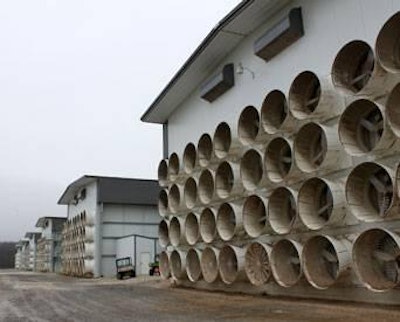
The U.S. Environmental Protection Agency is trying to link dust and feathers escaping from poultry houses via exhaust fans to stormwater nutrient discharges into waters of the United States in an effort to force dry litter poultry operations to file for National Pollution Discharge Elimination System, or NPDES, permits. At least one environmental activist group, the Waterkeeper Alliance, and one state environmental agency, the North Carolina Department of Environment and Natural Resources, have followed the EPA’s lead and have made the same arguments regarding the discharge of dust and feathers from exhaust fans. Poultry growers have scored two victories so far in the battle over dust and feathers, but the opposition has not thrown in the towel yet.
EPA versus the Alts
Thomas Hebert, environmental consultant, speaking at the United Egg Producers’ legislative board meeting, said that the lawsuit brought against the EPA by the owners of the Eight is Enough broiler farm, the Alt family, has major implications for all poultry producers. The Alts' saga began when the EPA sent them an enforcement order that said that they needed to file for an NPDES permit for the reason that they were discharging nutrients from their poultry houses because of feathers and dust leaving the houses via the ventilation fans. Failure to comply with this enforcement order would subject the Alts to up to $40,000 per day in fines.
As you might have guessed, the Eight is Enough farm has eight broiler houses in West Virginia. The Alts have received environmental awards for the stewardship of their operation from their integrator, Pilgrim’s. The Alts objected to this enforcement order, and they filed suit against the EPA in the federal district court in West Virginia. Both the West Virginia Farm Bureau Federation and the American Farm Bureau Federation stepped up and supported the Alt family’s lawsuit.
Hebert said: “EPA withdrew the enforcement order, we believe, because they had a sense that they were going to lose [in court] based on the facts here, and they didn’t want to lose the policy. The EPA filed a motion with the court to have the suit dismissed since the issue was moot because EPA had dropped its enforcement order. The Alts and the Farm Bureau responded with a brief asking the judge to rule on the policy of dust and feathers as a discharge since EPA could come back at either the Alts or other growers in the future and the court agreed. This will go to trial.”
Hebert also said that he thinks the judge will take a hard look at what the EPA is doing and that this is a good development for poultry producers.
Waterkeepers versus the Hudsons
In 2007, a seminar was put on by the University of Maryland Environmental Law Clinic on the Delmarva Peninsula to explain to individuals how to gather evidence and file environmental lawsuits against the poultry growers and integrators. The New York-based Waterkeeper Alliance was involved in the seminar, and this organization uses lawsuits to advance its environmental agenda.
Julie DeYoung, public relations consultant, told the audience at the Animal Agriculture Alliance Stakeholders Summit that on a flight over the Hudson family’s Maryland farm, a Waterkeeper saw what they thought was a pile of uncovered poultry litter. Waterkeepers routinely use small aircraft to fly over farms and look for potential lawsuits. What had actually been photographed at the Hudson farm was an uncovered pile of municipal biosolids waiting to be spread on some of the farm’s 200 acres as a soil amendment. A Maryland state agency confirmed that the pile was in fact biosolids and that it was being handled according to regulations.
A lawsuit was filed in against the Hudson family and Perdue Farms charging that nutrients in waters leaving the farm were the result of farm's poultry operations. The director of the University of Maryland Environmental Law Clinic served as the lead counsel in the case for the Waterkeepers, and the environmental group, Food and Water Watch, also participated and provided lawyers.
DeYoung said that even after the “pile” in question was proven to be biosolids and not litter, the Waterkeepers went forward with the lawsuit. Using the EPA's dust and feathers argument along with foot traffic in and out of the poultry house, the Waterkeepers essentially contended that day-to-day operations of a poultry farm pollutes and that liability for this is shared by the integrator. DeYoung characterized this lawsuit as a continuation of the Waterkeepers' attack on modern agriculture and said that losing it would have set a precedent in a number of unfavorable ways for poultry producers. The Waterkeepers employed a similar tactic against swine producers in North Carolina and forced a settlement.
Too expensive to fight?
The mounting legal bills were pressuring the Hudsons to consider settling the case or filing for bankruptcy. Forcing the Hudsons to settle would have given the Waterkeepers a way to move the case forward in other ways and encourage them to bring suits against other farmers. Fortunately, some local groups got together to raise funds for the Hudsons and formed SaveFarmFamilies.org, DeYoung reported. “More than a dozen fundraisers, everything from chicken dinners to a demolition derby were held. There was lots of creativity and grass roots support,” she said.
The judge wouldn’t dismiss the case, and it went to trial. The lawsuit was decided by the judge on December 20, 2012, in favor of the Hudsons and Perdue Farms. Perdue Farms and the Hudsons have filed to be reimbursed for legal costs; Perdue has asked for $2.5 million, and the Hudsons have asked for $500,000. Much of the Waterkeepers legal work was done pro bono.
The court of public opinion
DeYoung said that advocates for the Hudson family did a good job in getting the press coverage of the lawsuit to move away from the original “environmental groups versus factory farming” template to “environmental extremists versus a single family farm.” She said, “If a fourth generation, two chicken house, 40 cow, 200-acre family farm is a factory farm, then there are a whole lot of farms that are subject to attack from the Waterkeepers Alliance.”
SaveFarmFamilies.org brought the case to life for the public in a way that didn’t get the parties to the lawsuit “sideways” with the judge, DeYoung reported. “The specter of a large well-funded out-of-state environmental group going after a family farm resonated with a lot of people, including the governor of Maryland,” she said. The governor publicly scolded the University of Maryland Environmental Law Clinic for its role in instigating the lawsuit and in carrying it forward.
Many politicians wanted to deny public funding for the law clinic, according to DeYoung. A bill was passed by the legislature calling for the state to reimburse the Hudsons for their legal bills if the court doesn’t award these to them.
Moving forward
DeYoung said that in spite of the actions of the Waterkeepers, Perdue Farms is still committed to working with responsible environmental groups like the Chesapeake Bay Foundation. She cautioned the poultry industry that the Hudson lawsuit was just the first skirmish in what is sure to be an extended campaign by the Waterkeepers. “The Waterkeepers say they won’t give up and will likely learn from the judge’s ruling what the expectations are for evidence to prevail in another suit,” DeYoung said.
She stressed the importance of the poultry industry and agriculture in general not letting extremist groups start the conversation with the public. The industry can’t just sit back and wait to be attacked and then respond. “Agriculture has to speak for itself, you can’t wait for others to do it for you,” DeYoung said “Reporters can’t report what you don’t give them.” Transparency will be the key.
Rose Acre Farms versus department of natural resources
Rose Acre Farms and the North Carolina Department of Environment and Natural Resources have been battling for a couple of years over whether or not “dust and feathers” should be considered in an NPDES permit. In addition, Rose Acre is also contending that, based on current court rulings, its Hyde County, N.C., complex doesn’t need to file for an NPDES permit in the first place. The two sides in this dispute are currently in negotiations and the outcome is unknown at time of press.

















